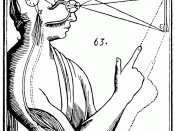Rene Descartes has generated many arguments proving that the mind and body are two separate realities, but none stronger than his "Argument from Consciousness". Due to the fact that Descartes states that the mind is a thinking thing and the body is not, the two entities cannot be the same. By proving that the mind is capable of such feats as knowing, questioning, imagining and wishing we are able to better understand the differences between the mind and the body.
The questioning of the mind-body relationship is rhetoric in itself because it proves that the mind is capable of doubt, which the body is not. As simple as it sounds, Descartes explains this in his writings from the Meditations on First Philosophy:
Thus, simply knowing that I exist and seeing at the same time that absolutely nothing else belongs to my nature or essence except that I am a thinking thing, I can infer correctly that my essence consists solely in the fact that I am a thinking thing (Descartes, qtd.
in Lawhead, 2003, 212).
By stating that he is a "thinking thing", Descartes offers the notions of love, fear, empathy and shame. These are all states that cannot be produced by the body, but by the mind.
Descartes is not giving way that the body does not exist, but rather stating why it is impossible to doubt the existence of the mind. But nonetheless, we could take his statement as far as to say that it is possible to exist without the body:
...on one hand, I have a clear and distinct idea of myself, in so far as I am simply a thinking, non-extended think; and on the other hand I have a distinct idea of a body, in so far as this is simply an extended, non-thinking...


